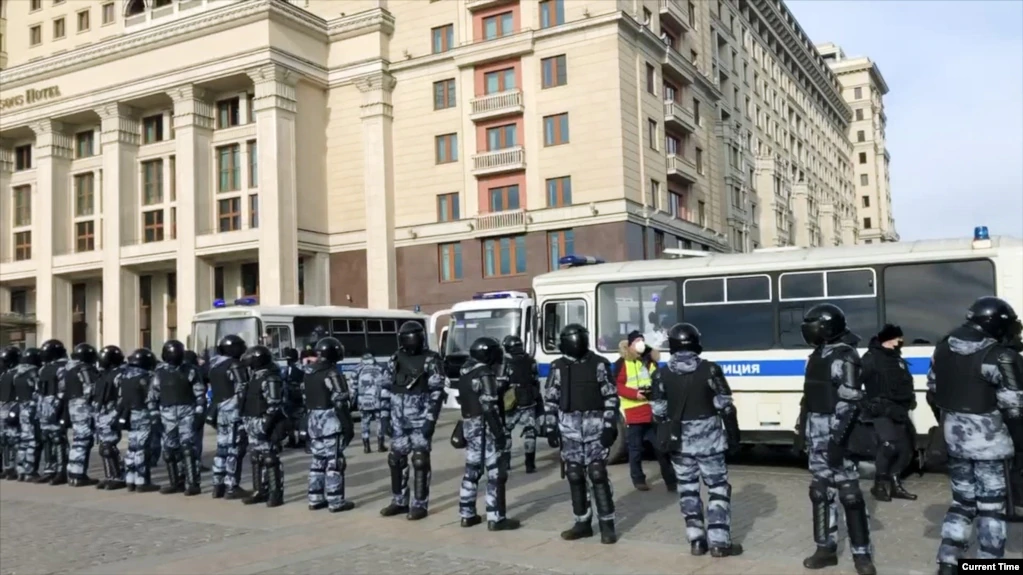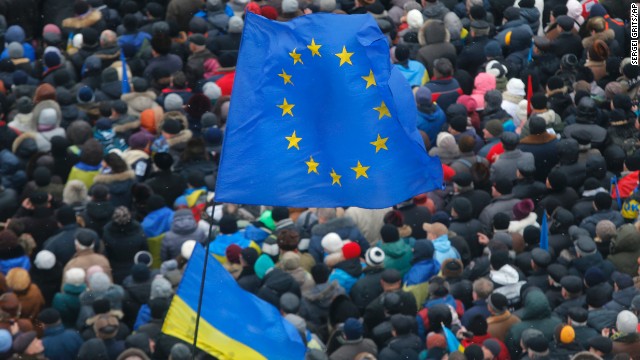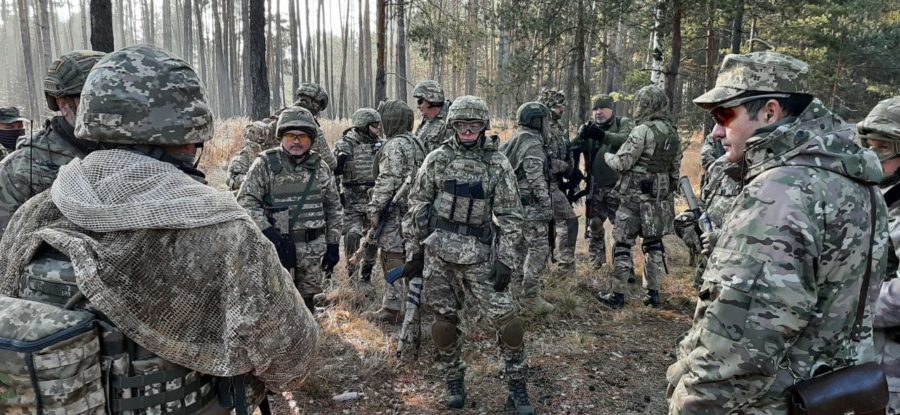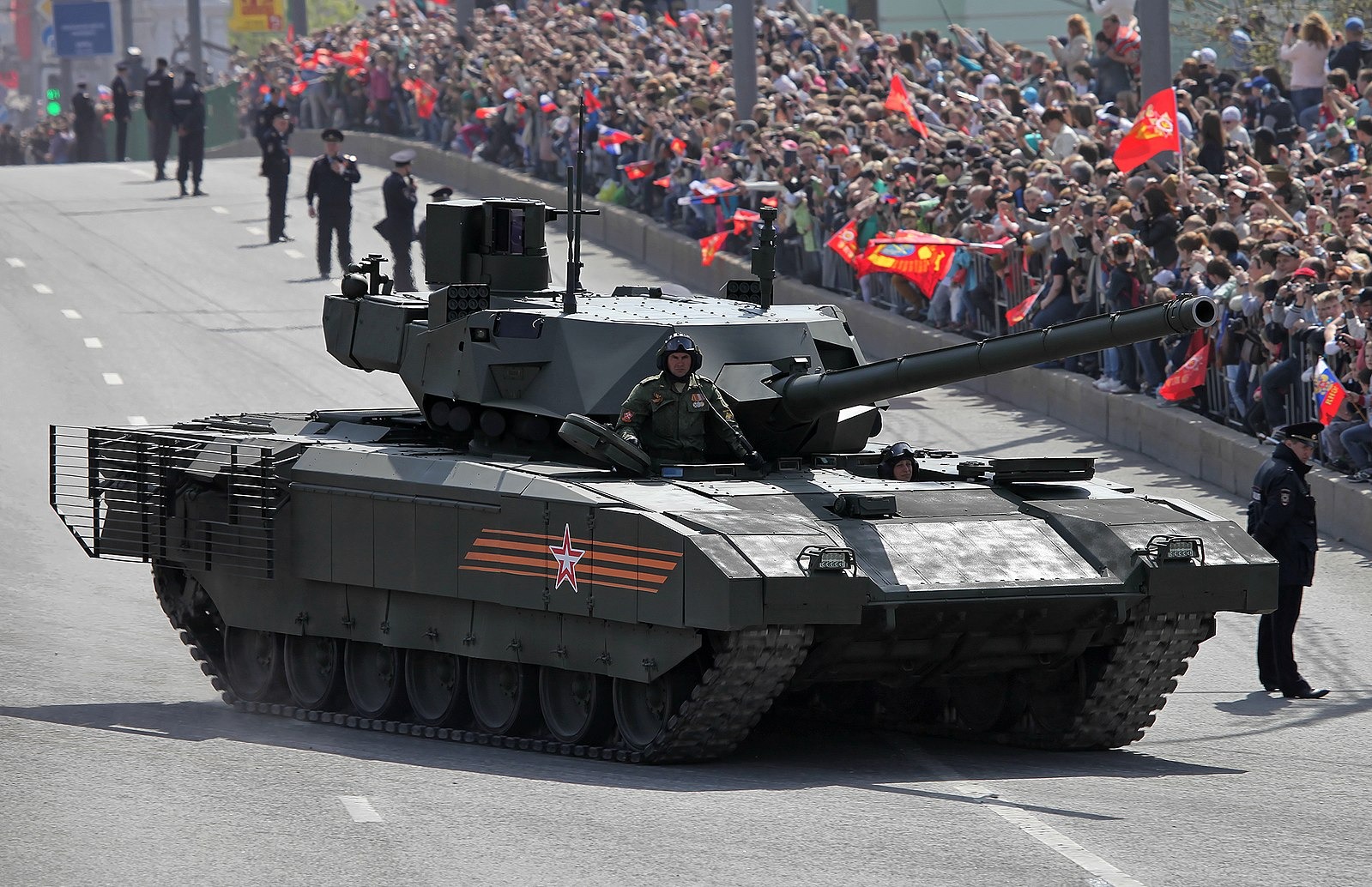But no less shocking for Ukrainians is the view of influential opposition figures in Russia who disagree with Putin. They, however, speak about the “tragedy of brotherly nations,” claim Kyiv as the center of a new democratic Russian(!) world, and complain about sanctions and isolation. While some Russians already did sincerely apologize for Russian crimes, these were not Russian intellectuals or the so-called opposition.
A large part of Russian democratic opposition also shares imperial worldview regarding Ukraine
In short, the Russian so-called opposition can claim democratic and liberal ideas, but a large part of it shares the same neo-imperial attitude towards Ukraine as Putin, looking at Ukraine not like Germany, France or any other European nation, but as a special “brotherly nation” that should remain under close Russian influence.
100 years ago, the Ukrainian writer and politician Volodymyr Vynnychenko wrote what became a popular aphorism in Ukraine:
“Russian liberalism ends when it comes to the Ukrainian question”
This applies to contemporary Russian opposition figures, such as Aleksei Navalny or even Russian intellectual Yulia Latynina.
A tweet by Yulia Latynina on 13 March 2022 that was widely criticized in Ukraine says:
“We are witnessing the revival of Kyivan Rus. From now on, everything that is in the Russian-speaking (!) world democratic, market and Western, will be concentrated in Kyiv. Kyiv will again become the capital of Rus. Moscow will be the capital of the Horde.”
Intentionally or not, Latynina ignores the fact that Kyiv is the capital of Ukraine which is not part of the “Russian-speaking world” but has its own Ukrainian language, even if about 40% of Ukrainians, mainly in the south-eastern part of the country, still use Russian at home.
Essentially, Latynina cannot accept Ukraine as not being part of the Russian world and an independent entity which after recent Russian crimes may want to distance itself as far as possible from Russia. At least, that is, until reparations are paid and an apology is made by Russia.
Among many similar Ukrainian responses to Latynina I would quote this one by Ukrainian contemporary writer Ostap Ukrayinets:
“People who know nothing about Ukraine but their own propaganda start talking about what this Ukraine should be for them. Yulia Latynina, I don’t know if you have already been told, but our national idea is ‘bugger off.’ You have Russia so live there and do not sublimate your frustration at us.”
Even Russian opposition leader Aleksei Navalny turned out to be not really in opposition when it came to Ukraine. Back in 2015, he was already trying to kill two birds with one stone, saying that the occupation of Crimea by Russia was the wrong decision but:
“Crimea belongs to those people who live in Crimea… Crimea will remain part of Russia and will never again become part of Ukraine in the foreseeable future.”
This is not the only example. When Ukraine established an independent Orthodox church free of Russian control in December 2018, Navalny’s response was particularly revealing:
“What existed for centuries was destroyed by Putin and his idiots in four years. Putin is the enemy of the Russian world.”
Instead of recognizing Ukraine’s right to Orthodox independence, Navalny decided to blame Putin for failing to maintain Russian influence in the country.
Obviously, not all in the Russian opposition share this view. However, such quotes explain why “anti-war protests” are not gathering as many people as one could expect.
The assumption that Russians would allegedly wake up under the pressure of sanctions and stop the war proved to be false. Sanctions do limit Russian economic and military power but don’t change the perception of the West as an enemy among ordinary Russians and Ukraine as the democratic party of Russia by the Russian opposition.
Majority of Russians believe what Russian media say
The Russian alternative reality of the West and Ukraine prior to the invasion was already analyzed and debunked here before the war. Putin’s newest allegations of biological weapons in Ukraine developed by NATO were also checked and disproved by the BBC, with the allegations having zero basis in fact.
Essentially, Putin uses the old Nazi technique of the big lie to turn reality upside-down so that nobody in Russia would believe he could distort the reality so infamously.
The big lie instrument allows him to construct the imagined enemy and mobilize Russian society in the worst traditions of the 1984 novel by George Orwell. This explains why Russian soldiers are still ready to fight against Ukraine and why Putin’s approval rating rose after he launched the war against Ukraine.
This is particularly evident in the Current Time vox populi.
Only two out of 14 people condemned the war against Ukraine; three didn’t comment because of “potential consequences,” while nine eagerly broadcast Russian propaganda about protecting Russians from a Ukrainian invasion and Putin’s clever preventive strike.
The other popular thesis was that the war was necessary to deter the West and “nationalist” Ukraine, that Ukrainian land was Russian historically and Putin is
merely returning it. Finally, some people refused to believe Russian troops are bombing cities in Ukraine and killing civilians.
One can rightfully claim these beliefs of ordinary Russians are induced by state censorship and strong propaganda. However, we must ask the Russian opposition elites why this was allowed to happen during the last 20 years of the formation of Putin’s neo-imperial regime.
Little hope for protests against war in Russia because it’s already too late, years of deputinization are needed
It appears that it’s too late for a real protest movement to emerge in Russia. The opposition, including Navalny’s team, called on Russians to participate in a 1,000,000 strong rally on 13 March, which was expected to be the central protest to stop the war. But in reality those who arrived to protest were immediately arrested even before the rally started, offering no resistance.
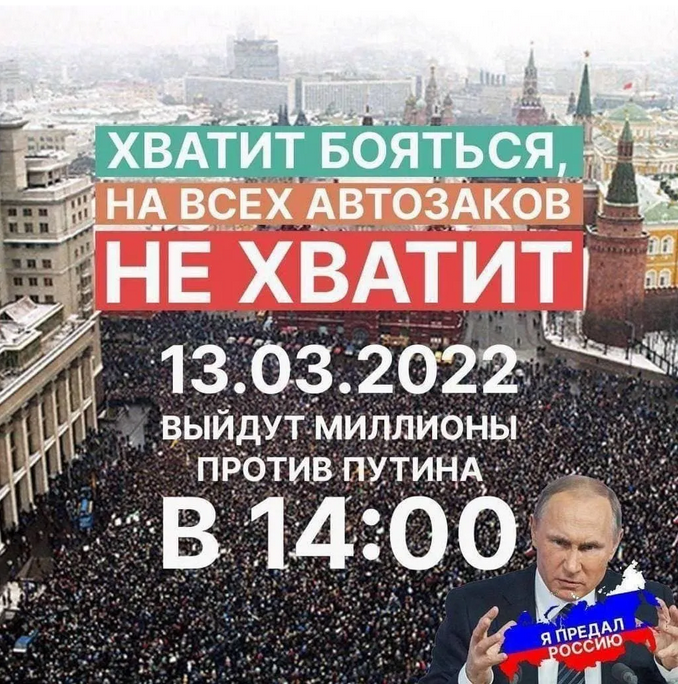
Although the announcement gave hope for the beginning of massive protests in Russia, this didn’t happen. In the photo below, showing Manezhnaya Ploshchad in Moscow at about 14:00 as reported by Novaya Gazeta, there were a few protesters who were arrested immediately. No photo of any massive rally was published.
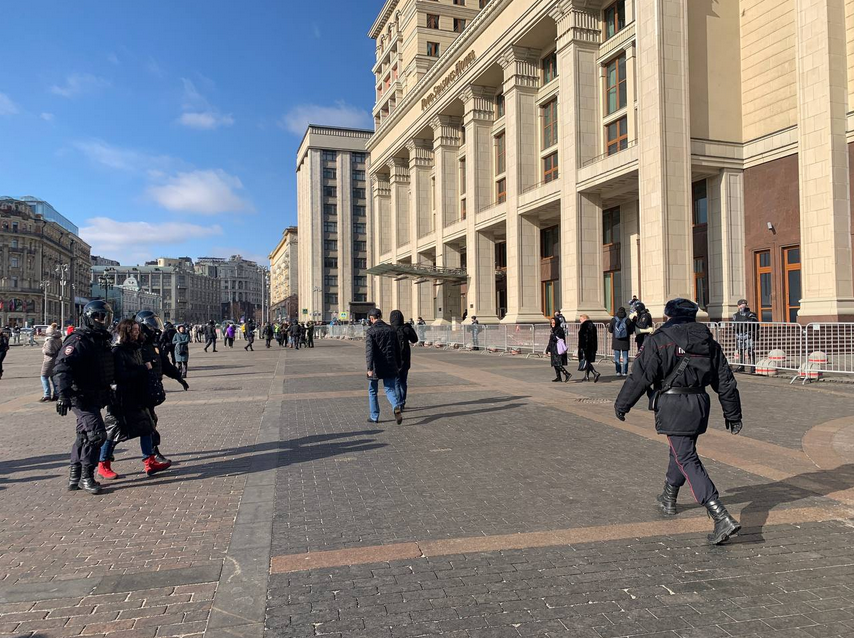
The same situation was observed in St. Petersburg and many other cities in Russia, where the first protesters were immediately arrested.
“Dear citizens, you are in the place of a possible rally that has not been coordinated with the executive authorities. And you are potential participants. We ask you to leave the square,” the police announced over and over.
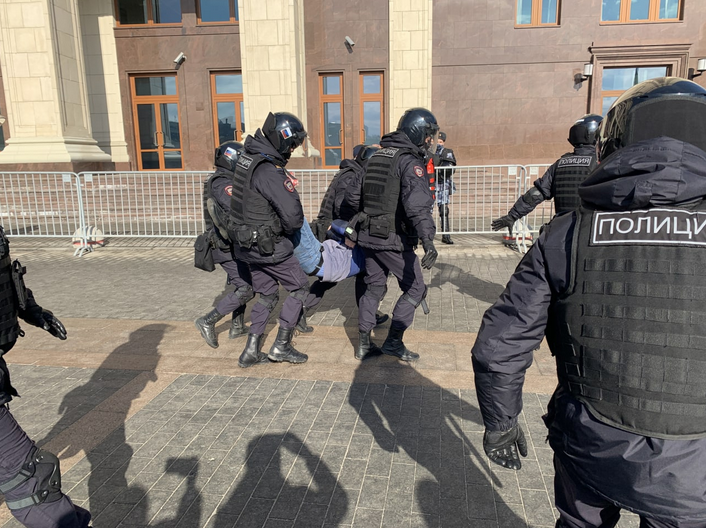
Today, the popular belief among Russians and their sympathizers in the West is that Putin’s regime is to blame for the war while ordinary Russians allegedly cannot do anything about it. This hypothesis was taken to the point where an appeal by the Nobel Laureates in support of Ukraine also claimed that “we do not believe the Russian people have a role in this aggression.”
So, is it Putin himself killing Ukrainian civilians, or ordinary Russians who perform orders by other Russian officers?
The most pro-Ukrainian Russian political party also tries to whitewash the Russian people today as allegedly not responsible for Russian aggression. The party’s letter describes the Russian war against Ukraine as “a crude attempt to determine the fate of Russia and its people without the participation of the people themselves.”
However, what Putin did during the last 20 years was done to the silent approval of the majority of Russians. In the same period, Ukrainians won two revolutions to protect democracy. There were no similar efforts in Russia.
Not all Russians approve of the war. But most do, sociology shows
Some already did sincerely apologize for Russian crimes. These were, however, not Russian intellectuals or opposition politicians but several ordinary Russians as well as musician Ivan Dremin. He said:
“Most Russians are to be blamed. Those who do not think with their own heads… Who else is to blame? Me, all the intelligentsia, all the voices of the generation, all the musicians. For the fact that each of us was not brave enough. For the fact that we could do more, but were afraid or too lazy. For understanding reality too late… I apologize to the entire Ukrainian people for the suffering that our country has caused to you. I apologize, for our state, for myself, for our people, because someone has to do this. And it happens that this hard lot always falls on people like me, because true evil will never have the courage to confess to themselves in their own atrocities.”
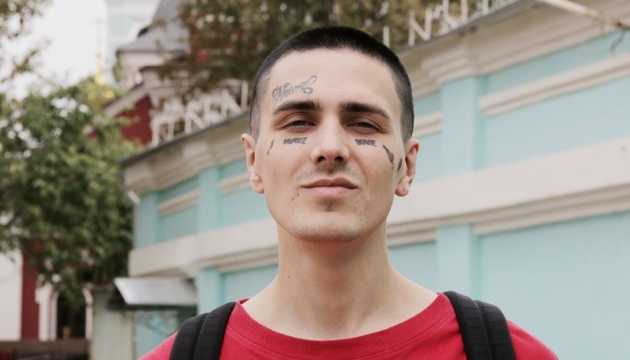
However, such appeals are rather the exception. Much more common are requests to lift Western sanctions in order to avoid erecting “a wall” between the world and Russia. Such appeals rarely mention the 112 Ukrainian children and hundreds of civilians who were killed by the 200,000 ordinary Russians who entered Ukrainian territory.
Despite these soldiers continuing to fight in Ukraine, Russians who left their country for the West, like Liza in Copenhagen, still claim Russians didn’t want war and complain about sanctions:
“I have not met a single Russian who wants this war. But I think very few Russians know what’s really going on. If you want to hear the truth, you have to search for a long time through hard-to-reach channels in the Telegram app,” Liza, a Russian student who decided to leave Russia after the war, wrote for the publication by the University of Copenhagen.
The iconic example is a Russian Instagram blogger. She complains about Instagram being blocked as a result of western sanctions. It is “(my) entire life” for her, while no mention is made of the lives of Ukrainians taken by her compatriots:
“Do you still think that for me as an Instagram influencer this is a source of income? To me it’s just – it’s my entire life. It’s my soul. It’s the one with which I wake up, fall asleep, f**king five years in a row.”
One of the #Russian bloggers cries that in two days her Instagram will stop working
She does not care at all about the thousands of dead people, including her compatriots. Obviously, her biggest worry right now is that she won’t be able to post pictures of food from restaurants. pic.twitter.com/LSdBiSlwHr
— NEXTA (@nexta_tv) March 11, 2022
A Ukrainian of the same age who lost her father at war has a different opinion about sanctions and related “difficulties” that Russians now face. She writes:
“I have zero empathy for the Russians, because I have full empathy for the suffering of Ukrainians:
- for the corpses of pregnant women from the bombed maternity hospital in Mariupol;
- for a friend who died under the rubble after the bombing in Chernihiv;
- for women raped by Russians in Kherson, Irpin, Bucha and Hostomel;
- for the mayor of Melitopol, who was abducted and tortured;
- for a car with civilians crushed by a Muscovite tank in Zaporizhzhia;
- for each and every person whose apartment was destroyed by shelling and rocket attacks
- for residents of all houses leveled to the ground in Volnovakha;
- for mothers in bunkers;
- for the mother of the 28-year-old soldier, at whose funeral I was in Lutsk today;
- for a child who died of dehydration in Mariupol;
- for every dead soldier who protects us
- finally, for my father, who died in battle with the Russians in 2014…
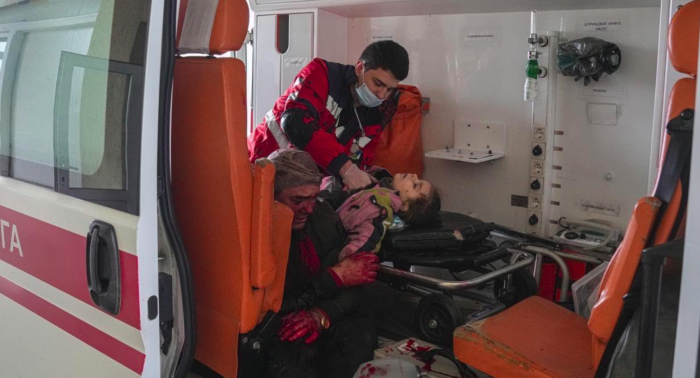
Related:
- 71% of Russians feel “pride, joy, respect, hope” regarding war against Ukraine – poll
- What Russians think about Russia’s war in Ukraine: video
- Putin’s Big Lie: the “Donbas genocide” and “impending Ukrainian attack”




